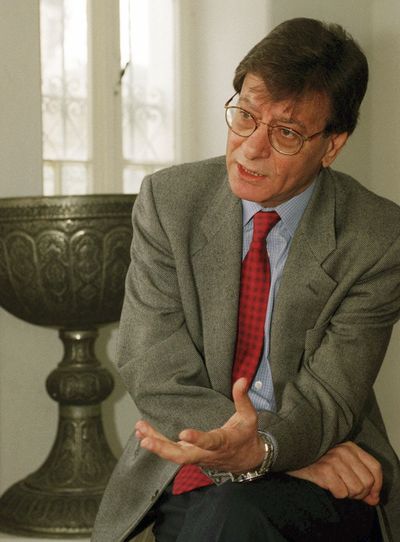Palestinian poet Darwish dies at 67

GAZA CITY, Gaza Strip – Mahmoud Darwish, whose prose gave voice to the Palestinian experience of exile, occupation and infighting, died on Saturday in Houston. He was 67.
The predominant Palestinian poet, whose work has been translated into more than 20 languages and won numerous international awards, died following open heart surgery at a Houston hospital, said Nabil Abu Rdeneh, a spokesman for Palestinian President Mahmoud Abbas.
Born to a large Muslim family in historical Palestine – modern-day Israel – he emerged as a Palestinian cultural icon, eloquently describing his people’s struggle for independence while also criticizing both the Israeli occupation and the Palestinian leadership. He gave voice to the Palestinian dreams of statehood, crafted their declaration of independence and helped forge a Palestinian national identity.
“He felt the pulse of Palestinians in beautiful poetry. He was a mirror of the Palestinian society,” said Ali Qleibo, a Palestinian anthropologist and lecturer in cultural studies at Al Quds University in Jerusalem.
Darwish first gained prominence in the 1960s with the publication of his first poetry collection, “Bird without Wings.” It included the poem “Identity Card” that defiantly spoke in the first person of an Arab man giving his identity number – a common practice among Palestinians when dealing with Israeli authorities and Arab governments – and vowing to return to his land.
Many of his poems have been put into music – most notably “Rita,” “Birds of Galilee” and “I yearn for my mother’s bread” – and have become anthems for at least two generations of Arabs.
He wrote another 21 collections, the last, “The Impression of Butterflies,” in 2008.
Qleibo described Darwish’s poetry as “the easy impossible,” for Darwish’s ability to condense the Palestinian narrative into simple, evocative language – breaking away from the more traditional heavy, emotive and rhythmic verse of other Arab poets.
Darwish wrote the Palestinian Declaration of Independence in 1988, read by the late Palestinian leader Yasser Arafat when he unilaterally declared statehood. The declaration was symbolic and had no concrete significance.
Darwish’s influence was keenly felt among Palestinians, serving as a powerful voice for many.
“He started out as a poet of resistance and then he became a poet of conscience,” said Palestinian lawmaker Hanan Ashrawi. “He embodied the best in Palestinians … even though he became iconic he never lost his sense of humanity. We have lost part of our essence, the essence of the Palestinian being.”